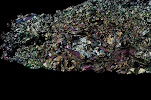Since my current contract ends in December, I’ve been watching the various geology email lists and job boards for interesting sounding jobs. Recently a friend of mine sent me a link to a position that isn’t in the academic world, but sounds like it would be fun, and I meet all of their “essential” requirements, though not necessarily all of their “desirable” ones, unless you take into consideration things I’ve done that are similar to what they are looking for.
However, this position has a much more formal application process than I underwent to obtain my current job. Their application packet makes it clear that a CV will not be considered, but instead we are instructed to fill in “details of your previous employment, starting with the most recent. Please include details of any time not accounted for (including unemployment)”. I had never had to compile a complete job history before, and it took a fair bit of time to remember everything I’ve ever done and fill in the boxes on the form (Date of employment, Name and address of Employer, Position held, description of main duties and responsibilities, achievements and reason/s for leaving). Once I’d completed that task and written my “Statement in Support of Application (Outline your reasons for applying and how your experience, knowledge and skills meet the job description, person specification and key competencies for the post. All the essential criteria must be covered)” I sent my completed form to my sister for comment.
While I have spent my life in Academia, my sister has been in the business world. She completed a Master’s in Education degree, but wound up going into corporate training rather than teaching at a school. She is also a writer (although I keep a blog, I don’t consider myself to be a writer; I’m a reader, who is willing to share thoughts via writing now and again). The feedback she gave me on my application packet was amazing—in just a few short paragraphs she captured the essence of one of the biggest problems I have in writing.
She had commented to me that I should delete some of the detail from my job list—that there is no need to show more than one job that happened at the same time, and no employer will care that I did modeling for a life drawing class while I was an undergraduate. I pointed out that I tend to err on the side of caution when deciding what information to include, and my brutally honest tendencies mean that I want to write down “everything”. To which she replied:
“Resumes and job apps are no different than any other type of writing: you must consider your audience and what they will be looking for, as well as your topic, angle, and goals for writing. That is, my guess is when you worked on a geology paper or presentation, you have more data points available to use than you actually include in your paper. That does not mean that you have been less than honest, or incomplete, it just means that you have likely chosen a specific idea to focus on, and analyzed, synthesized, and used the data that best informs that topic. Similarly, the level of depth and detail will vary if you're presenting to geologists in the same area of specialty to you, vs a broader field of geologist, vs a group of multi-disciplinary scientists, vs a room full of lay-people. In these situations, you would naturally think about who your audience is, the starting point they're at, what they would understand, and what might engage their interest.”
I laughed when I read this, thinking of the complaints I’ve heard people make about papers submitted for publication by recent PhD’s—that we tend to write papers that “read like a thesis”. In short we include too much information, wanting to share *everything* we learned in the course of our PhD projects. My first attempts at writing up my results certainly went that direction, and my advisor told me that it read too much like a thesis, and that I needed to go back and change it to the style of a paper. He even gave me papers I might use as a model. I’ve been putting off doing just that (it has been a year and a month since I submitted my thesis—my how time flies!), but reading my sister’s comments above, I think I may have a better handle on how to accomplish that goal.
My sister then went on to say:
“A resume or job application is only different in that it is a marketing document as much as it is a historical document. Its entire purpose is to get you to an interview. Anything that does not advance that purpose should not be included. Now, in the case of "list your entire work history and account for any gaps" listing all your experience does have a clear purpose. Still, you do get to decide how you present each item to make it relevant, or downplay it if it is not, as well as whether or not to include multiple items over the same time span. Also, you get to decide the "starting point" of your work history. Going back to a paper route when you were 9 years old is probably more information than the hiring manager needs to know (actually that was me with the paper route, but you get the idea).”
While I have long known the rule “write for your audience”, I don’t think I had *really* thought about what this meant in terms of job applications before. No wonder some of my applications never made it to the interview stage!
Her next paragraph included the gem “First, frame everything in terms of what you have achieved versus what you have done. (It's the difference between "managed the sales department" and "Improved sales by 40%" - or in your case between, "researched



